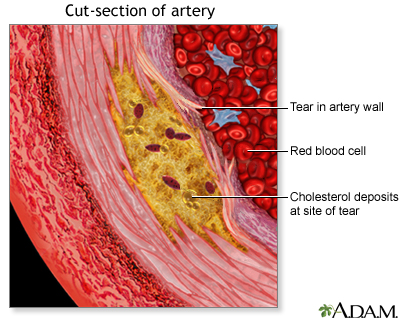| Step 2: Take high blood pressure seriously |
In individuals with high blood pressure, their blood pressure stays elevated all or most of the time. Their blood pushes against the walls of the arteries with a greater-than-normal force. If untreated, this can lead to serious medical problems. Click the red buttons below to learn more about these problems.

atherosclerosisstrokeheart attackenlarged heartkidney disease
Effects on multiple organs -- It is important to realize that although high blood pressure may have no outward symptoms, it can cause problems with multiple organs. To see specific examples of how high blood pressure affects blood vessels, the heart, and the kidneys, click the red buttons over the picture above. |
Atherosclerosis and stroke - videos
Thickening in the artery (atherosclerosis) related to high blood pressure can be dramatic. A healthy artery is wide and allows blood to flow freely. By contrast, a clogged artery is narrow, thick, and makes the heart work a lot harder to pump blood through it. Arteries anywhere in the body can be affected, including those to the heart itself and the brain. This can lead to a heart attack or stroke.
Watch arteries supplying blood to the brain grow thicker and narrower. Need Quicktime? |
Stroke is one of the most common causes of death in the U.S., and high blood pressure is a major risk factor. Clots that form in the carotid arteries (in the neck) or the heart can break off and travel to the brain, lodging in the narrowed arteries. In addition, the risk of a stroke resulting from bleeding in the brain is increased in people with high blood pressure.
Watch a video about stroke. Need Quicktime? |
Other complications
Other medical problems related to high blood pressure can include loss of vision and blindness, sexual dysfunction, mental problems, and bone loss. Read more about these conditions.
To continue to the next step of the high blood pressure guide, click "next" below.
The descriptions of heart attack and kidney disease were written by the National Institutes of Health.
Reviewed By: Steven Kang, MD, Division of Cardiac Pacing and Electrophysiology, East Bay Arrhythmia, Cardiovascular Consultants Medical Group, Oakland, CA. Review provided by VeriMed Healthcare Network. Also reviewed by David Zieve, MD, MHA, Medical Director, A.D.A.M., Inc.
